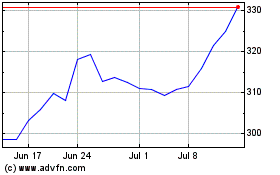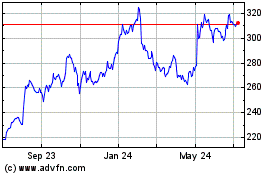Amgen's Repatha Study Shows Reduced Risk of Heart Attack, Stroke
March 17 2017 - 9:29AM
Dow Jones News
By Jonathan D. Rockoff and Betsy McKay
Researchers found that Amgen Inc.'s new cholesterol-lowering
drug Repatha reduced the risk of deaths, heart attacks and strokes
by 20% compared with standard treatment with statin drugs, a
benefit that the biotech hopes will persuade health insurers to pay
the more than $14,500 yearly list price.
Yet the risk reduction, although significant, may still not be
enough for health plans to ease the tight restrictions on use of
the expensive drug.
Repatha, among the new injectable cholesterol-fighting agents
known as PCSK9s, was approved in 2015 after studies showed it cut
levels of bad cholesterol. Unclear was whether that LDL-cholesterol
reduction also reduced the risk of heart-related events, such as
heart attacks and strokes.
Without such evidence, health plans have limited access to
Repatha as well as rival drug Praluent, from Sanofi SA and
Regeneron Pharmaceuticals Inc., in favor of much-cheaper statins
pills.
Amgen said last month that Repatha had met the goals of its
study, but released the specific findings only on Friday at a
medical meeting.
Results from the Amgen-sponsored trial, which studied 27,564
patients over 2.2 years, confirmed the real-world benefit of adding
Repatha to statin treatment and didn't find any risk of serious
side effects, Amgen research and development chief, Sean Harper,
said.
The study found the addition of Repatha cut the risk of an array
of heart-related events by 15% and reduced the chance of stroke,
heart attack and death specifically by 20% compared with patients
taking only a statin.
Amgen is "very confident," Dr. Harper said, that doctors will
view the results as "practice-changing" and incorporate Repatha
into their care of patients whose cholesterol remains high despite
treatment with a statin or who can't tolerate a statin.
Stephen Kopecky, professor of cardiovascular diseases at the
Mayo Clinic in Rochester, Minn., cautiously praised the results.
"It really is incredible that the drug could do even more than
statins," he said. "But if you look at it, there are still a lot of
people having troubles. This wasn't one of these results where you
say, 'wow, this is an incredible reduction.'"
He prescribes the drug for patients who can't be helped by
statins or other cholesterol-lowering drugs and said he would
likely stick with that prescribing pattern. "I'm not sure this is
going to change my practice pattern much. We need to be judicious,
because of price and because we want patients to remember that it's
not just about the drug," he said, noting patient also need to
stick to a healthful lifestyle.
Health plans and drug-benefit managers still may not find the
benefits sufficient to justify the high price-tag. "Payers may need
to see 25% or more" risk reduction before loosening their
reimbursement restrictions, Leerink Partners' Geoffrey Porges said
in a recent research note.
In making its case to the payers, Amgen may point to the study's
finding that the risk reduction improved after giving Repatha six
months. After a year's treatment, patients taking Repatha were at a
25% lower risk of heart-related events, Dr. Harper said.
Write to Jonathan D. Rockoff at Jonathan.Rockoff@wsj.com and
Betsy McKay at betsy.mckay@wsj.com
(END) Dow Jones Newswires
March 17, 2017 09:14 ET (13:14 GMT)
Copyright (c) 2017 Dow Jones & Company, Inc.
Amgen (NASDAQ:AMGN)
Historical Stock Chart
From Mar 2024 to Apr 2024

Amgen (NASDAQ:AMGN)
Historical Stock Chart
From Apr 2023 to Apr 2024
